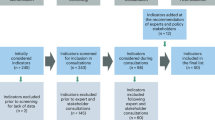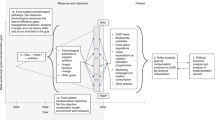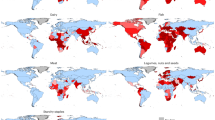Abstract
The 2021 United Nations Food Systems Summit (UNFSS) marked a key moment in deliberating a transformation of the global food system. At the same time, the UNFSS process received considerable criticism for alleged industry capture and high symbolism. Here we assess the extent to which the summit has contributed to ambitious policy follow-up at national level. Using natural language processing tools, we systematically analyse and compare the content of 124 national food system pathway documents. We find that food production dominates these pathways, while issues such as food distribution, processing, consumption, environmental impacts, labour conditions and animal welfare receive minimal attention. Despite different national food system challenges, the pathways show limited variation in topics raised, closely following predefined global agendas. Our results suggest that the policy directions of UNFSS national pathways are mainly within the current food system, while more fundamental critiques of the food system are not raised.
This is a preview of subscription content, access via your institution
Access options
Access Nature and 54 other Nature Portfolio journals
Get Nature+, our best-value online-access subscription
$32.99 / 30 days
cancel any time
Subscribe to this journal
Receive 12 digital issues and online access to articles
$119.00 per year
only $9.92 per issue
Buy this article
- Purchase on SpringerLink
- Instant access to full article PDF
Prices may be subject to local taxes which are calculated during checkout




Similar content being viewed by others
Data availability
The source materials for this paper have additionally been made available under an MIT license via figshare at https://doi.org/10.6084/m9.figshare.29307239 (ref. 38).
Code availability
All code used in the analysis has been made available under an MIT license via Zenodo at https://doi.org/10.5281/zenodo.15652546 (ref. 39).
References
Food Systems Summit +2. Nat. Food 4, 529 (2023).
Schneider, K. R. et al. The state of food systems worldwide in the countdown to 2030. Nat. Food 4, 1090–1110 (2023).
Lang, T., Barling, D. & Caraher, M. Food Policy: Integrating Health, Environment and Society (Oxford Univ. Press, 2009).
von Braun, J., Afsana, K., Fresco, L. O. & Mohamed Hag Ali Hassan, M. H. A. (eds) Science and Innovations for Food Systems Transformation (Springer, 2023).
Canfield, M. C., Duncan, J. & Claeys, P. Reconfiguring food systems governance: the UNFSS and the battle over authority and legitimacy. Development 64, 181–191 (2021).
Anderl, F. & Hißen, M. How trust is lost: the Food Systems Summit 2021 and the delegitimation of UN food governance. Eur. J. Int. Relat. 30, 151–175 (2023).
Canfield, M., Anderson, M. D. & McMichael, P. UN Food Systems Summit 2021: dismantling democracy and resetting corporate control of food systems. Front. Sustain. Food Syst. 5, 661552 (2021).
Fakhri, M. The Food System Summit’s disconnection from people’s real needs. J. Agric. Environ. Ethics 35, 16 (2022).
Trewern, J. et al. Youth demand political action on healthy sustainable diets. Nat. Food 2, 746–747 (2021).
Nisbett, N. et al. Equity and expertise in the UN Food Systems Summit. BMJ Glob. Health 6, e006569 (2021).
Coutinho, J. G., Martins, A. P. B., Preiss, P. V., Longhi, L. & Recine, E. UN Food System Summit fails to address real healthy and sustainable diets challenges. Development 64, 220–226 (2021).
Covic, N. et al. All hat and no cattle: accountability following the UN Food Systems Summit. Glob. Food Secur. 30, 100569 (2021).
National Pathways Analysis Dashboard (United Nations Food Systems Coordination Hub, 2023).
Wright, S. J., Sietsma, A., Korswagen, S., Athanasiadis, I. N. & Biesbroek, R. How do countries frame climate change? A global comparison of adaptation and mitigation in UNFCCC National Communications. Reg. Environ. Change 23, 129 (2023).
Candel, J. J. L. & Daugbjerg, C. Overcoming the dependent variable problem in studying food policy. Food Secur. 12, 169–178 (2019).
Fanzo, J. et al. Viewpoint: rigorous monitoring is necessary to guide food system transformation in the countdown to the 2030 global goals. Food Policy 104, 102163 (2021).
Fouilleux, E., Bricas, N. & Alpha, A. ‘Feeding 9 billion people’: global food security debates and the productionist trap. J. Eur. Pub. Policy 24, 1658–1677 (2017).
World Development Report 2008: Agriculture for Development (World Bank, 2008).
IPCC Special Report on Climate Change, Desertification, Land Degradation, Sustainable Land Management, Food Security, and Greenhouse Gas Fluxes in Terrestrial Ecosystems (IPCC, 2019).
Robinson, J. Squaring the circle? Some thoughts on the idea of sustainable development. Ecol. Econ. 48, 369–384 (2004).
Turnhout, E. et al. Do we need a new science-policy interface for food systems? Science https://doi.org/10.1126/science.abj5263 (2021).
Lesnikowski, A. et al. What does the Paris Agreement mean for adaptation? Clim. Policy 17, 825–831 (2017).
Weikmans, R., van Asselt, H. & Roberts, J. T. Transparency requirements under the Paris Agreement and their (un)likely impact on strengthening the ambition of nationally determined contributions (NDCs). Clim. Policy 20, 511–526 (2020).
Reporting and Review (UNFCCC, accessed 16 January 2024); https://unfccc.int/reporting-and-review
Ford, J. D. et al. Adaptation tracking for a post-2015 climate agreement. Nat. Clim. Change 5, 967–969 (2015).
Ford, J. D. & Berrang-Ford, L. The 4Cs of adaptation tracking: consistency, comparability, comprehensiveness, coherency. Mitig. Adapt. Strateg. Glob. Change 21, 839–859 (2016).
Candel, J. J. L. & Pereira, L. Towards integrated food policy: main challenges and steps ahead. Environ. Sci. Policy 73, 89–92 (2017).
Member State Dialogues Synthesis (UN, 2022); https://summitdialogues.org/wp-content/uploads/2022/03/Member-State-Dialogue-Synthesis-Report-4-March-2022-EN.pdf
Sietsma, A. J. et al. Machine learning evidence map reveals global differences in adaptation action. One Earth 7, 280–292 (2024).
Lucas, C. et al. Computer-assisted text analysis for comparative politics. Polit. Anal. 23, 254–277 (2015).
Grootendorst, M. BERTopic: neural topic modeling with a class-based TF-IDF procedure. Preprint at https://arxiv.org/abs/2203.05794 (2022).
Reimers, N. & Gurevych, I. Making monolingual sentence embeddings multilingual using knowledge distillation. Preprint at https://arxiv.org/abs/2004.09813 (2020).
McInnes, L., Healy, J. & Astels, S. hdbscan: hierarchical density based clustering. J. Open Source Softw. 2, 205 (2017).
McInnes, L., Healy, J. & Melville, J. UMAP: uniform manifold approximation and projection for dimension reduction. Preprint at https://arxiv.org/abs/1802.03426 (2020).
Müller-Hansen, F., Callaghan, M. W. & Minx, J. C. Text as big data: develop codes of practice for rigorous computational text analysis in energy social science. Energy Res. Social Sci. 70, 101691 (2020).
Nutrition and Food Systems (HLPE, 2017).
Ingram, J. A food systems approach to researching food security and its interactions with global environmental change. Food Secur. 3, 417–431 (2011).
Sietsma, A. United Nations Food Systems Summit submissions [Dataset]. figshare https://doi.org/10.6084/m9.figshare.29307239.v1 (2025).
Sietsma, A. J., Candel, J. & Biesbroek, R. Code to replicate Candel et al, “National pathways for food systems transformation are limited in scope and degree of ambition”. Zenodo https://doi.org/10.5281/zenodo.15652546 (2025).
The State of Food Security and Nutrition in the World: Urbanization, Agrifood Systems Transformation and Healthy Diets across the Rural–Urban Continuum (FAO, IFAD, UNICEF, WFP & WHO, 2023).
Acknowledgements
The work of R.B. was supported through the Dutch Research Council (NWO grant no.VI.Vidi.211.132).
Author information
Authors and Affiliations
Contributions
J.C. and R.B. conceptualized and designed the study. A.J.S., with support of R.B., developed and executed the data collection and analysis, the outcomes of which were interpreted by J.C., A.J.S. and R.B. collectively. J.C. led the writing of the paper, with support from A.J.S. and R.B. A.J.S. made the figures.
Corresponding author
Ethics declarations
Competing interests
J.C. is member of the Dutch Council on Animal Affairs. The other authors declare no competing interests.
Peer review
Peer review information
Nature Food thanks Matthew Canfield, Shailaja Fennell and Bram Peters for their contribution to the peer review of this work.
Additional information
Publisher’s note Springer Nature remains neutral with regard to jurisdictional claims in published maps and institutional affiliations.
Supplementary information
Supplementary Information
Supplementary Table 1: overview of the topics, their respective label and the keywords associated.
Rights and permissions
Springer Nature or its licensor (e.g. a society or other partner) holds exclusive rights to this article under a publishing agreement with the author(s) or other rightsholder(s); author self-archiving of the accepted manuscript version of this article is solely governed by the terms of such publishing agreement and applicable law.
About this article
Cite this article
Candel, J., Sietsma, A.J. & Biesbroek, R. National pathways for food systems transformation are limited in scope and degree of ambition. Nat Food 6, 809–816 (2025). https://doi.org/10.1038/s43016-025-01206-y
Received:
Accepted:
Published:
Issue date:
DOI: https://doi.org/10.1038/s43016-025-01206-y



